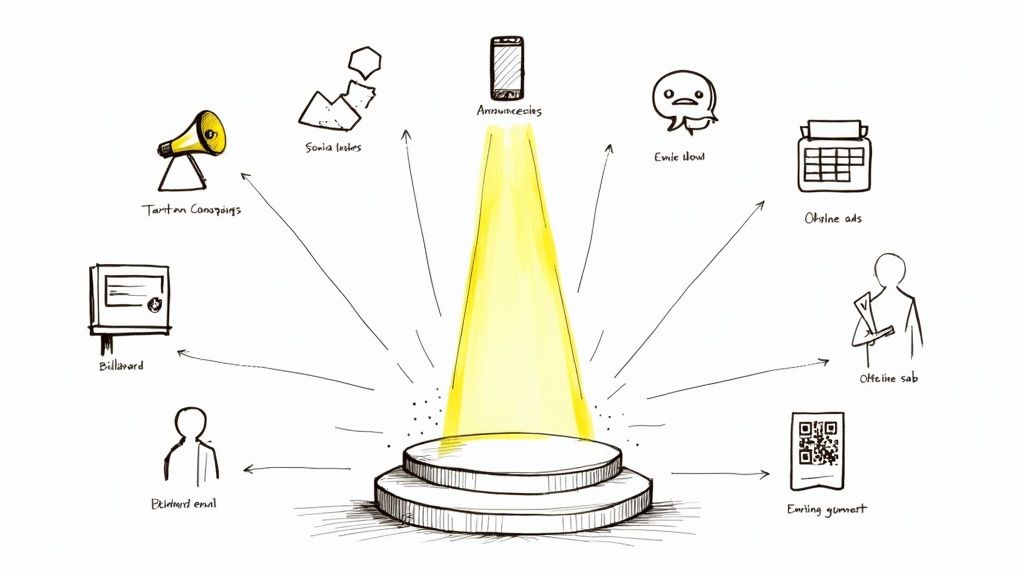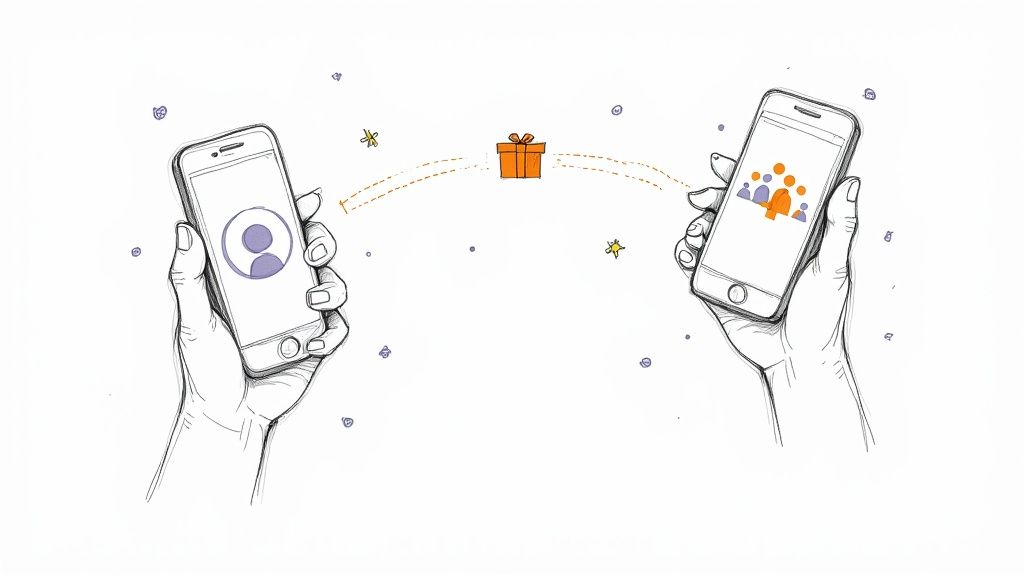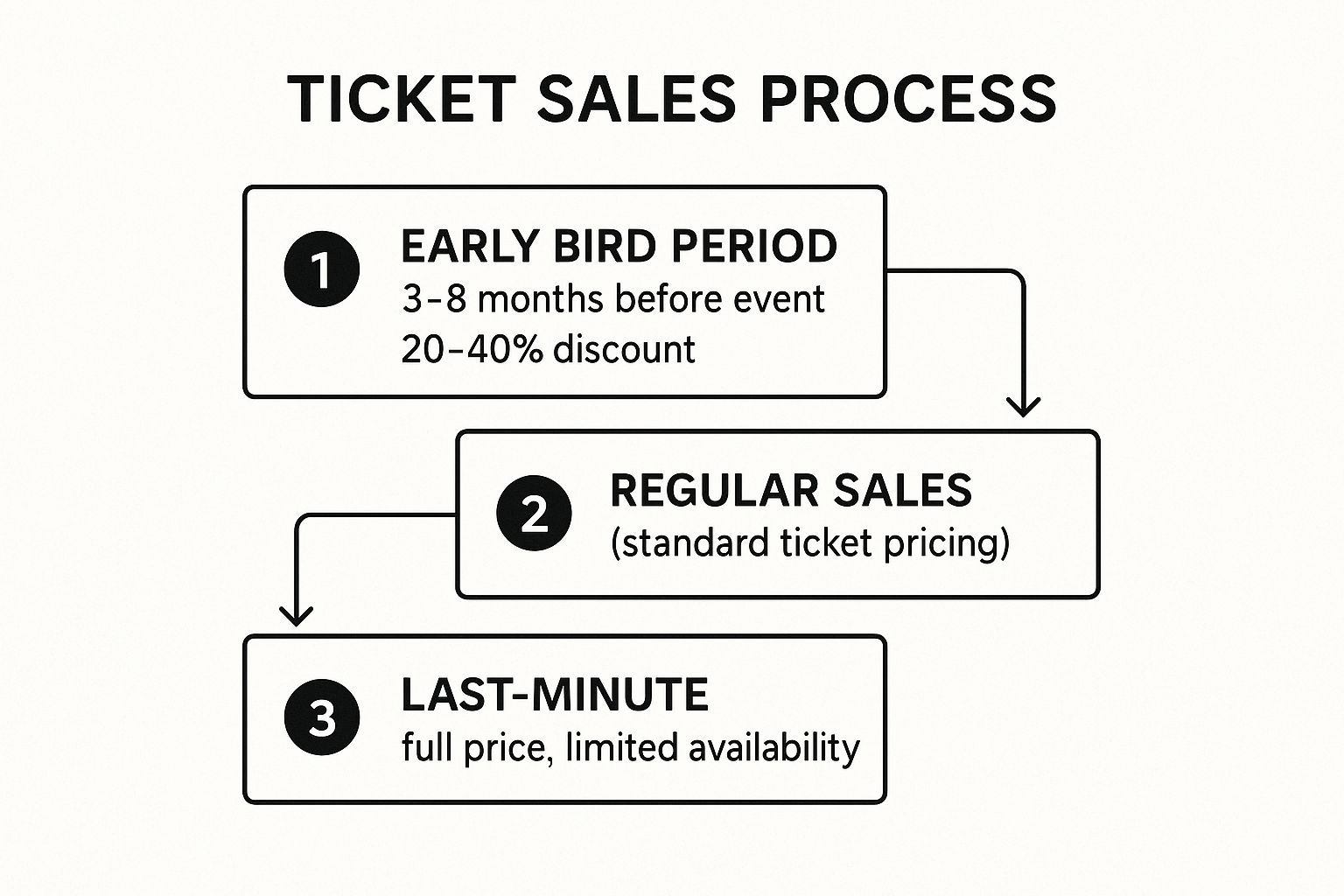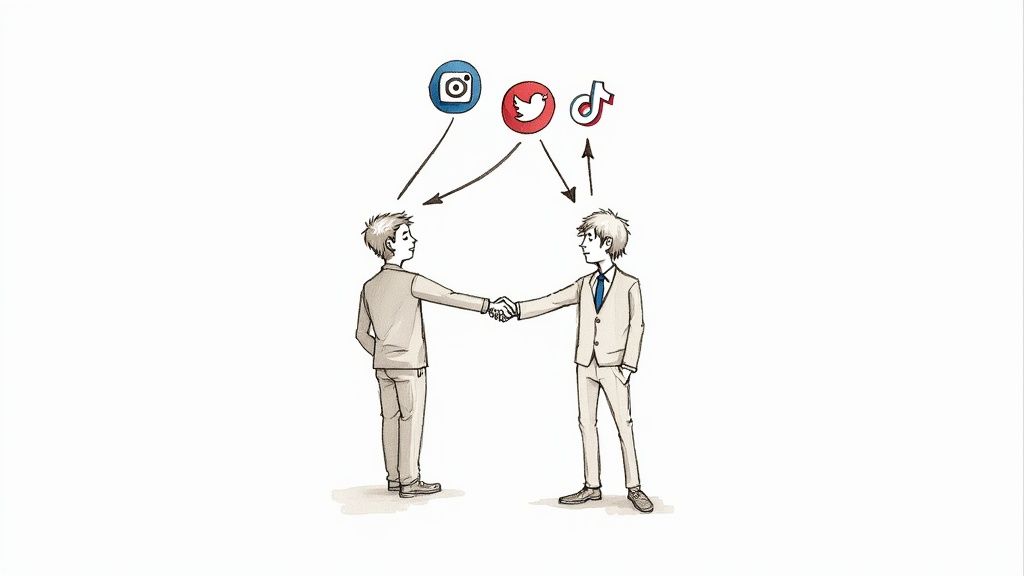September 11, 2025

Organizing a stellar event is only half the battle; the real challenge lies in filling the room. The old "build it and they will come" mindset simply doesn't work in a competitive market. A successful event requires a strategic, multi-channel promotion plan that creates buzz, engages potential attendees, and drives ticket sales. Without a robust marketing strategy, even the most groundbreaking conference or compelling workshop will fail to reach its audience, resulting in empty seats and missed opportunities. This is where a well-executed promotional playbook becomes essential.
This guide moves beyond generic advice to provide a comprehensive roundup of actionable events promotion ideas you can implement immediately. We will cover a diverse mix of strategies, from leveraging social media contests and influencer collaborations to executing targeted email campaigns and building local community partnerships. Each idea is designed to be a practical tool in your marketing arsenal, helping you attract the right attendees and ensure your event is a resounding success. To truly stand out in today's crowded market, consider exploring the power of experiential marketing, which focuses on creating immersive, memorable experiences for attendees. Let’s dive into the tactics that will transform your event from a well-kept secret into a must-attend occasion.
One of the most effective events promotion ideas for generating rapid, organic buzz is hosting contests and giveaways on your social media channels. This strategy turns your audience into active promoters by incentivizing them to share your event with their networks. The core idea is simple: offer a high-value prize, such as free tickets, a VIP upgrade, or exclusive merchandise, in exchange for specific user actions like liking, sharing, tagging friends, or creating user-generated content (UGC).
This approach excels at creating a viral loop where each participant exposes your event to a new audience. For example, a "tag-a-friend" contest on Instagram instantly puts your event in front of potential attendees who trust their friends' recommendations. This tactic not only boosts your reach but also significantly increases engagement on your social profiles, signaling to platform algorithms that your content is valuable.

To maximize participation and ensure a return on investment, structure your contest carefully. The prize should be directly related to your event to attract a relevant audience, not just freebie seekers. Beyond contests, understanding the impact of social media on trade shows and other events can reveal deeper strategies for audience engagement.
#YourEventNameVIP) to track entries and measure social reach easily.This method is highly effective in the weeks leading up to an event when you want to accelerate ticket sales and build a sense of excitement and urgency. To further enhance your campaign, you can explore other creative giveaway ideas for your events.
A classic yet powerful events promotion idea is implementing an early bird pricing strategy. This approach involves offering discounted tickets for a limited time, typically several months before the event date, to incentivize early commitment. The core principle is to reward proactive attendees with savings, which in turn provides you with crucial early revenue, helps gauge initial audience demand, and builds foundational momentum long before the main marketing push begins.
This tactic creates a sense of urgency and exclusivity, encouraging potential attendees to act quickly rather than procrastinate. For example, major conferences like SXSW and music festivals like Bonnaroo have perfected this model by launching presales with discounts of 30-40%. This not only secures a base audience but also generates early social proof, as people begin sharing their excitement about attending. It's a proven method for kickstarting ticket sales and validating your event concept early in the planning cycle.
The following process flow illustrates the typical stages of a graduated event pricing strategy, from initial early bird offers to last-minute sales.

This visual guide demonstrates how to structure pricing tiers to maintain sales momentum throughout the entire promotional timeline.
To execute an effective early bird campaign, your structure and communication must be crystal clear. The discount needs to be substantial enough to motivate immediate action, and the deadline should be firm to create genuine urgency. This approach helps stabilize cash flow and provides valuable data on attendee demographics far in advance.
This strategy is most effective during the initial launch phase of your event promotion, as it provides the initial capital and audience data needed to scale your marketing efforts effectively.
A powerful way to extend your event's reach is through strategic collaborations with influencers, industry thought leaders, and complementary brands. This approach leverages the established trust and audience of your partners, providing an authentic endorsement that traditional advertising often struggles to achieve. By tapping into their networks, you introduce your event to highly engaged and relevant communities.
This strategy goes beyond simple promotion; it’s about creating mutually beneficial relationships. For instance, a tech conference might partner with industry analysts to host a pre-event webinar, or a local food festival could collaborate with popular food bloggers for exclusive preview content. These partnerships generate credible buzz and content that resonates deeply with the target demographic, making it one of the most effective events promotion ideas available.

Successful partnership marketing requires careful selection and clear communication. The key is to find partners whose brand values and audience demographics align perfectly with your event's goals. While these partnerships are excellent for promotion, they can also lead to more formal arrangements. For those interested, exploring how to find sponsorships for events can open up additional revenue and promotional opportunities.
This strategy is especially effective for reaching niche audiences and building credibility in the months leading up to your event, as authentic endorsements can significantly influence ticket-buying decisions.
A systematic email marketing campaign is one of the most powerful events promotion ideas for nurturing potential attendees from initial awareness to final ticket purchase. This strategy leverages direct communication to build a relationship over time, delivering personalized and value-driven content straight to your audience's inbox. Unlike social media, email provides a dedicated channel where you control the messaging and can track engagement with detailed analytics.
The approach works by segmenting your audience and sending targeted messages that resonate with their specific interests. For instance, a conference like SXSW uses weekly newsletters to build anticipation with speaker announcements, while TED sends personalized email recommendations based on a user's viewing history. This keeps your event top-of-mind and moves leads through the sales funnel by consistently providing valuable information and clear calls-to-action.
An effective email campaign is more than just sending a single announcement; it's a carefully planned sequence. You need to provide genuine value beyond just "buy tickets now" to keep subscribers engaged and prevent them from tuning out. A well-executed campaign can drive significant ticket sales and foster a loyal community around your event.
This method is ideal for the entire event lifecycle, from the initial "save the date" announcement to last-minute ticket pushes and post-event follow-ups.
Content marketing and SEO are long-term events promotion ideas that build sustainable, organic interest in your event. This strategy involves creating and distributing valuable, relevant content that attracts your target audience through search engines. Instead of directly promoting, you provide genuine value, establishing your event as an authoritative resource and attracting qualified attendees who are actively seeking information related to your niche.
This approach creates lasting digital assets that drive traffic long after their initial publication. For instance, a business conference can publish an in-depth industry report that ranks on Google, continuously drawing in professionals. Similarly, a music festival could create behind-the-scenes video content or artist interviews that engage fans and improve search visibility for related terms, creating a flywheel of discovery and engagement.
A successful content and SEO strategy requires a deep understanding of your audience’s search behavior. By creating content that answers their questions and solves their problems, you build trust and guide them naturally toward your event. Start by identifying the topics and keywords your potential attendees are searching for. More advanced marketing ideas for events often integrate content as a core pillar of their campaign.
This strategy is ideal for building brand authority and generating consistent, low-cost leads over time, making it a foundational element of any comprehensive event marketing plan.
Referral programs are a powerful events promotion idea that turns your existing attendees into a motivated sales force. This strategy incentivizes your current ticket holders or community members to invite their networks by offering rewards for successful referrals. It's a classic word-of-mouth marketing tactic supercharged with a clear incentive, leveraging the inherent trust people have in recommendations from friends and colleagues.
This approach is highly effective because it taps into existing relationships to attract qualified leads. A personal invitation from a peer is often far more convincing than a traditional advertisement. For example, a conference organizer might offer a 25% discount on a future ticket to both the referrer and the new attendee they bring in. This creates a win-win scenario that encourages sharing and accelerates organic growth while rewarding loyalty.
A successful referral program hinges on a seamless user experience and a compelling offer. The easier it is for someone to share, and the more valuable the reward, the higher your participation rate will be. The reward should align with your event's value, motivating action without devaluing your brand.
This method is ideal for scaling attendance once you have an established base of registrants. It works exceptionally well for community-focused events, industry conferences, and workshops where attendees are likely to know others who would benefit from attending.
Building strategic partnerships with local businesses, organizations, and community groups is one of the most powerful events promotion ideas for creating authentic, grassroots support. This approach taps into existing networks and leverages trusted local voices to advocate for your event, effectively turning partners into an extension of your marketing team. The core concept is mutual benefit: you offer exposure to your audience, and they promote your event to their established customer base.
This strategy excels at building local credibility and reducing marketing costs. For instance, a food festival partnering with popular local restaurants for cross-promotion instantly gains the trust of those restaurants' loyal patrons. Similarly, a tech conference collaborating with a university connects directly with an engaged, relevant student and faculty audience. This method creates a powerful network effect where each partner amplifies your message through their own channels.
To forge successful and lasting partnerships, focus on creating clear, tangible value for everyone involved. The key is identifying businesses whose audience mirrors your target demographic and presenting a compelling, mutually beneficial offer. Developing these relationships is fundamental, much like learning how to build an online community requires nurturing connections.
This approach is especially effective for community-focused events or for organizers looking to establish a strong local footprint. It builds a foundation of support that can pay dividends for years to come.
Offering a free workshop or a smaller "teaser" event is a powerful events promotion idea that demonstrates value before asking for a commitment. This strategy gives potential attendees a direct taste of the quality, content, and atmosphere of your main event, building trust and converting warm leads into paying customers. The concept is to provide genuine value upfront, leaving attendees eager for the full experience.
This approach works exceptionally well because it lowers the barrier to entry and directly addresses attendee hesitation. For instance, a tech conference might host a free one-hour coding workshop, or a wellness retreat could offer a complimentary guided meditation session online. These mini-events act as high-quality previews, showcasing expertise and creating a direct sales opportunity with a highly engaged audience who has already experienced what you offer.
The key to a successful teaser event is to balance providing real value with creating intrigue for the main event. You want attendees to leave feeling they learned something valuable but also recognizing that the main event holds even more. It’s a preview, not the entire show.
This method is ideal for events where the quality of the content or the expertise of the speakers is a primary selling point, as it allows you to prove your value proposition firsthand.
User-generated content (UGC) campaigns are powerful events promotion ideas that transform your audience into a volunteer marketing force. This strategy encourages attendees, speakers, and fans to create and share their own content related to your event, such as photos, videos, and testimonials. By leveraging authentic voices, you build powerful social proof that is far more credible and influential than traditional advertising.
This approach amplifies your reach organically as attendees share their excitement within their personal networks. For instance, a tech conference might encourage attendees to post their key takeaways on LinkedIn, while a music festival could run a photo contest for the best crowd shot. These authentic posts build a sense of community and FOMO (fear of missing out), making your event appear more desirable to prospective attendees.
A successful UGC campaign is built on clear incentives and simple participation. Your goal is to make it easy and rewarding for your community to create content that aligns with your event's brand and promotional goals. For a deeper dive into leveraging attendee engagement, explore top user generated content strategies for events that turn guests into valuable content creators.
#YourEvent2024) to track all submissions and unify the conversation.This strategy is highly effective both before and during the event to build hype and showcase real-time experiences, providing a rich library of authentic marketing assets for future promotions.
Securing earned media coverage through strategic press releases and media outreach is a powerful way to build credibility and reach a broad audience. This classic events promotion idea involves communicating with journalists, bloggers, and media outlets to gain third-party validation. Unlike paid advertising, a feature in a reputable publication or a mention on a popular podcast acts as an endorsement, positioning your event as newsworthy and significant.
This approach is highly effective for events like major tech conferences such as CES, which generate global media attention, or local business summits featured in regional publications. The key is to craft a compelling story that provides value to the outlet's audience, moving beyond a simple announcement to highlight unique speakers, groundbreaking topics, or significant industry impact.

A successful media outreach campaign requires careful planning and a personalized approach. Start by identifying the right contacts. Pitching a music festival to a tech journalist is ineffective. Instead, build a targeted list of reporters and influencers who cover your specific niche.
This strategy is ideal for lending authority to your event and reaching audiences that might not be active on your primary social media or email channels.
Navigating the landscape of event promotion can feel like juggling a dozen different tasks at once. From launching a compelling social media giveaway to orchestrating a strategic partnership with local influencers, the list of potential actions is extensive. We've explored a diverse set of powerful events promotion ideas, including the urgency of early-bird pricing, the credibility of influencer marketing, and the community-building power of user-generated content campaigns. Each tactic offers a unique pathway to capturing your audience's attention and driving ticket sales.
However, the true magic isn't in executing one of these ideas flawlessly; it's in weaving them together into a cohesive, multi-channel strategy. A standalone press release might get you some media mentions, but when combined with a targeted email campaign to your subscribers and a pre-event teaser workshop, its impact multiplies exponentially. The goal is to create an omnipresent promotional engine where each component supports and amplifies the others, ensuring your event remains top-of-mind for your target audience across every platform they use.
To move from a simple checklist to a dynamic strategy, focus on three core principles: Integration, Measurement, and Adaptation.
Mastering these events promotion ideas is about more than just filling seats; it's about building a vibrant community, creating lasting buzz, and establishing your event as a can't-miss occasion. By thoughtfully selecting, integrating, and measuring a diverse mix of these strategies, you transform your promotional efforts from a series of disconnected actions into a powerful, unified campaign that delivers exceptional results and a sold-out event.
Ready to streamline your event management and supercharge your promotional efforts? GroupOS provides an all-in-one platform designed to manage your community, automate event marketing, and analyze attendee engagement. Explore how GroupOS can help you execute these ideas with greater efficiency and impact.


